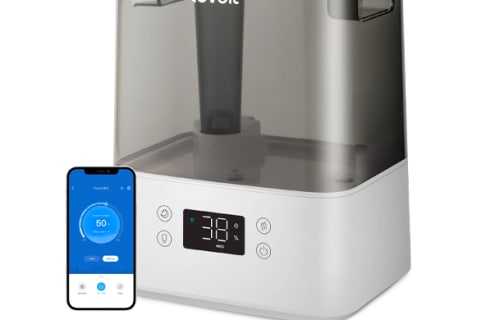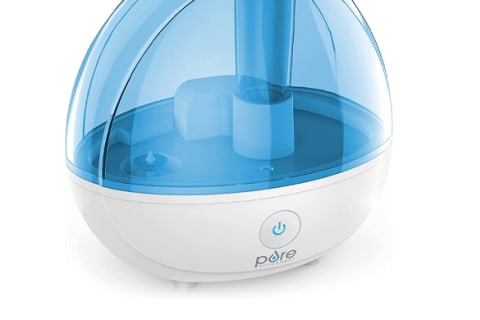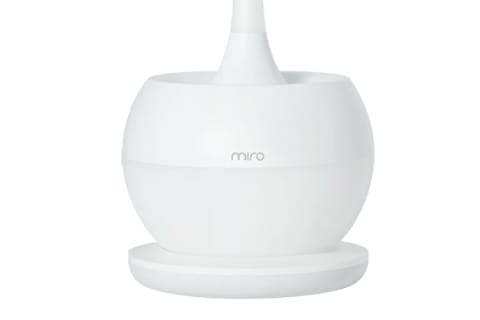Advertisement
The Top Benefits & Risks Of Humidifiers (Plus, Who Should 100% Avoid Them)

Along with fluffy blankets and cozy candles, humidifiers are often the first things to come out of storage once the weather turns chilly and dry. But do they really deserve to be seasonal staples?
Humidifiers can be helpful for specific respiratory and skin concerns, but they're not for everyone and they need to be used carefully. Here's an overview of the top benefits of humidifiers and how to find the right one—plus, how to know if you're better off without them.
Benefits of humidifiers
The ideal humidity range for homes is around 40-50%—meaning your air should contain about 40-50% of the moisture that it can possibly hold. You can measure your home's humidity using a hygrometer (they're cheap and readily available). If your humidity falls below this range, you have dry air.
Dry air is more common during the fall and winter when the weather outside is colder. If your home isn't well insulated, turning on your heater can further strip moisture from the air.
Running a humidifier at home can help bring humidity levels back to this sweet spot. They can be beneficial for a few reasons:
They can increase respiratory comfort in those with lung diseases
If you already have difficulty breathing, dry air might make the problem worse. "Air that is dry and cold has the potential to aggravate respiratory problems if you have a history of asthma or wheezing," board-certified allergist and immunologist Anjuli Mehrotra, M.D., tells mindbodygreen.
The American Lung Association also notes that dry air can irritate the airways of people with lung diseases like COPD, leading to wheezing, coughing, and shortness of breath.
If you have a preexisting respiratory condition, you'll want to be diligent about keeping your home's humidity in the 40-50% range; humidifiers can help you do that.
They improve skin hydration during winter
Another annoying side effect of dry air is skin irritation. A dry environment can damage the skin moisture barrier and lead to itchiness, redness, and a less-than-glowy appearance. As mindbodygreen's assistant beauty & health editor Hannah Frye writes, keeping a humidifier running at home is one way to maintain a healthy skin barrier, even during colder months.
A beauty editor's review:
They can help clear your sinuses when you have a cold
Low humidity can dry the mucus membranes in your nose and throat—exactly what you don't want if you're dealing with sinus issues. Running a humidifier to add moisture to the air can help loosen mucus and unblock your airways1 when you have sinus pressure due to a cold or mild sinus infection, Mehrotra explains.
However, humidifiers can do more harm than good when your sinus pressure is due to allergies—more on that later.
They may make sleep more comfortable for some people
Sleeping with a humidifier can reduce your risk of waking up with an irritated throat—especially if you breathe through your mouth at night. However, it won't necessarily improve your overall sleep quality.
According to research examining how humidity affects heavy snoring2 and sleep apnea3, higher humidity doesn't do anything to reduce the severity of either condition.
Still, if you always wake up with a dry, scratchy throat once the weather turns, placing a humidifier near your bed is worth a shot.
They can help out your houseplants
Share your home with green friends? They might appreciate being set up near a humidifier. Many popular houseplants—from ferns to ficus plants—come from tropical environments that rarely get as dry as our homes do. Giving these plants some extra humidity can keep their leaves looking more vibrant year-round.
Summary
Finding the right humidifier
When shopping for a humidifier, you'll want to consider how much square footage you're hoping to fill, how much noise you're comfortable with, and how much space you're willing to take up with the machine. The best at-home humidifiers are energy-efficient, easy to clean, and intuitive to operate.
Our picks for the best humidifiers
Risks & side effects
At the end of the day, dry air, while annoying, isn't harmful to your health. But air that is too moist can be. If your home's humidity starts to surpass 50-60%, it can harbor dust mites and mold—indoor contaminants that cause potentially dangerous allergic reactions4.
"As an allergist, I am not too keen on humidifiers since they can actually worsen allergies," says Mehrotra. This is due to their potential to increase humidity too much, encouraging dust mites and mold.
"Mold is a living organism that needs two things to thrive: a food source (such as dust or organic materials like insulation and drywall) and water (a leak, a spill, or any area that has humidity levels above 60%)," mold remediation expert Michael Rubino recently explained on mindbodygreen.
Humidifiers can also cause problems if they're not properly maintained. "Unfortunately, the construction of a lot of humidifiers makes it difficult to clean the inside," environmental toxins expert Lara Adler previously told mindbodygreen. If not properly cleaned, damp humidifiers can become breeding grounds for mold and toxic spores. Filling your humidifier with unfiltered water can also introduce chemicals you don't necessarily want in your air.
For these reasons, if you do use a humidifier, it's important to fill it with filtered water, clean it regularly, and only run it when your home's air is actually dry (less than 50% humidity).
Who shouldn't use a humidifier?
Mehrotra notes that people who suffer from dust mite or mold allergies should steer clear of humidifiers (and might need a dehumidifier instead). If your home is fully carpeted, you'll want to avoid humidifiers, too, as carpeting can trap humidity and lead to dust mite growth.
Summary
Alternatives to humidifiers
If you struggle with occasional sinus issues or respiratory irritation in winter but don't want to shell out for a humidifier, a portable steam vaporizer may be a better option.
"Individual steam vaporizers can be helpful for sinus issues, even for allergies, as they do not tend to increase the humidity within an entire room," says Mehrotra. "I feel that individual steam vaporizers are more useful than humidifiers as they are more directed toward sinus passages. The directed moisture is helpful with breaking up mucus and can make it feel easier to breathe."
That said, it's still important to keep steam vaporizers clean and dry in order to prevent mold growth.
If you're looking to slightly increase your home's humidity without a machine, you can also boil some water (uncovered), shower with the door open, or spritz a spray bottle full of water.
Other ways to keep your home's air healthy
Proper humidity is just one element of healthy indoor air. Here are a few other habits that will help you breathe easier at home:
- Invest in an air purifier, and stay on top of changing its filters.
- Clean up spills and pooled water ASAP, and hang wet items up to dry to prevent mold.
- Keep up with your cleaning routine, and use nontoxic products.
- Clean your carpets regularly.
- Use an exhaust fan when cooking.
- Run a fan when showering or taking a bath.
- Avoid candles and air fresheners made with synthetic scents.
- Open windows on low-pollution days.
- Consider investing in an air quality monitor to keep tabs on how your air is doing.
FAQ
What does a humidifier do for you?
Humidifiers can help add moisture to dry air, which may be helpful for those who suffer from respiratory issues like asthma. They can also keep your skin moist during cold, dry months. Beyond being helpful for some humans, they're good for certain tropical houseplants, too.
What are the negatives of a humidifier?
Humidifiers can do more harm than good in some cases. If you add too much humidity to your space (exceeding 50%), it can increase your risk of mold and dust mites. Humidifiers themselves can also develop mold if not properly cared for. Here are some tips for keeping them clean and dry between uses.
Is it good to sleep with a humidifier?
If you often wake up with a scratchy throat, lubricating your air with a humidifier may help. There's no evidence to show that sleeping with a humidifier enhances sleep quality, though.
The takeaway
By adding moisture to dry air, humidifiers can help ease certain respiratory symptoms, refresh skin, and nourish our favorite houseplants. However, they can also make indoor air too humid, which can set the stage for mold and dust mites. Suspect that you've gone overboard on the humidity? Here are some signs you could use a dehumidifier at home.


